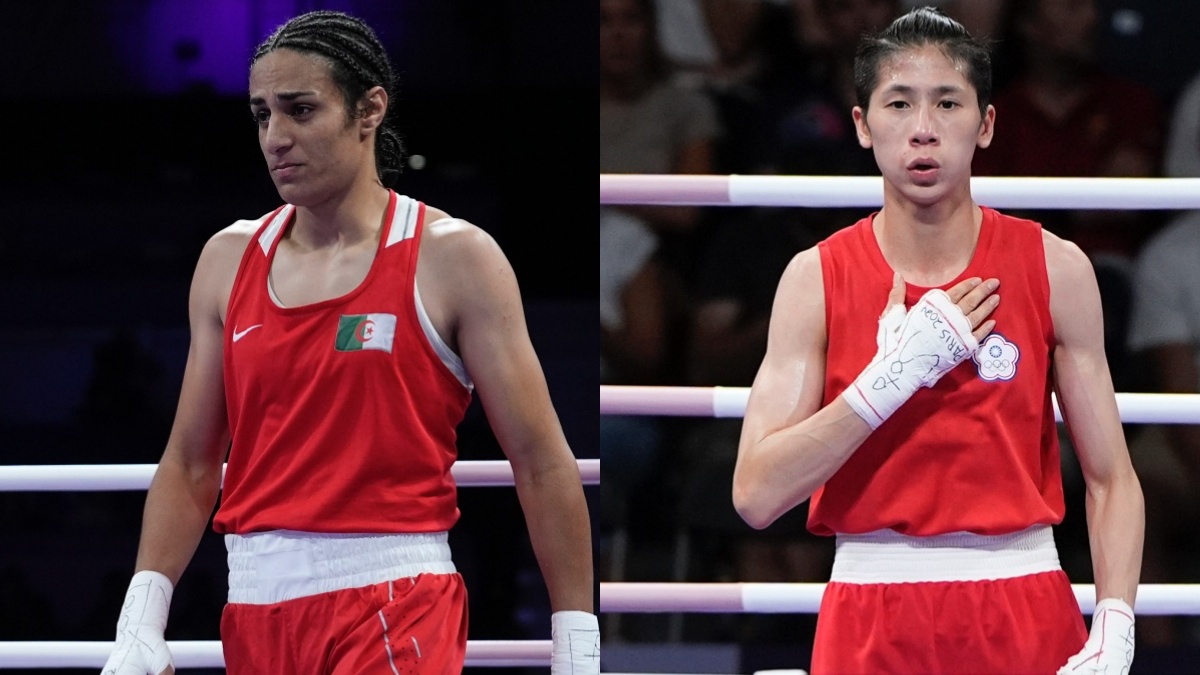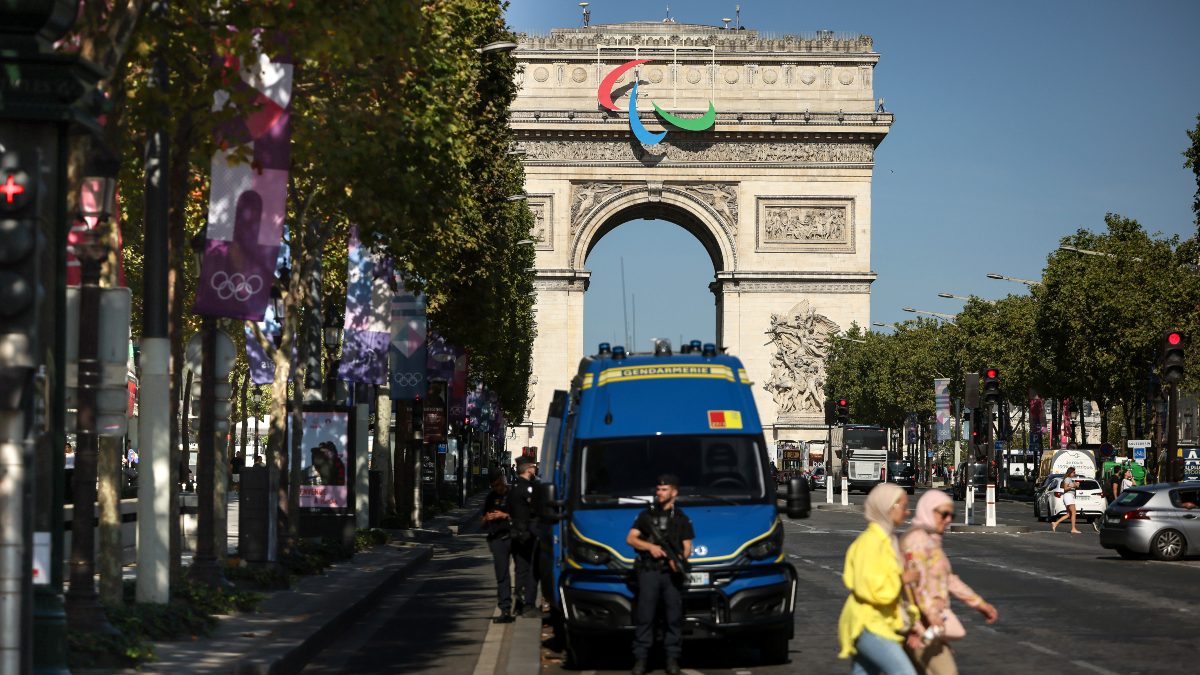We take a look at the gender row at Paris 2024, which has spread far outside the ring and is complicated, with even Olympic officials admitting it’s a “minefield”. read more
)
Imane Khelif (L) and Lin Yu-ting (R) are at the heart of the gender row controversy that has engulfed the Paris Olympics. AP
A controversy has engulfed the boxing event at the Paris Olympics after two female competitors, who previously failed gender eligibility tests, were drawn into the Games. One of the two boxers stopped her opponent in just 46 seconds.
Is it a male vs female situation? Who are the two boxers in the line of fire? How have the International Olympic Committee (IOC), who are running the boxing programme at Paris 2024, responded to the allegations?
We take a look at the row, which has spread far outside the ring and is complicated, with even Olympic officials admitting it’s a “minefield”.
Who are the two boxers?
Algeria’s Imane Khelif, 25, boxing in the 66kg category, and 28-year-old Taiwanese Lin Yu-ting, fighting at 57kg, are the two athletes in the heat of the controversy.
The row erupted after Khelif won her bout against Italy’s Angela Carini in just 46 seconds with two strong punches to the Italian’s nose.
Both Khelif and Lin were disqualified from the 2023 world championships in New Delhi run by the International Boxing Association (IBA) after failing to meet “eligibility criteria”.
However, both competed in the Tokyo Olympics three years ago and were cleared to fight in Paris.
How did Imane Khelif take up boxing?
Khelif grew up in a poor rural family in the dusty Algerian province of Tiaret on the edge of the Sahara desert, a place of high temperatures and traditional values.
Her desire to play football with boys – and her ability to upstage them – led to intimidation and occasionally violence, with her talent for dodging punches leading her to consider taking up boxing.
To do so, she needed the approval of her father, a welder, as well as money to afford the bus trips to a training centre in a local town, an expense she helped pay for by collecting scrap metal.
“At the start of my career I felt that I might not be able to continue… because my family did not accept the idea, and also the views of society, which considered that I was doing something bad by doing my sport,” she told the official Algerian news agency APS in 2022.
EXPLAINED: What is testosterone?
After a career that has since taken her to the Olympics twice and the world championships, her parents are now “her biggest fans,” the 25-year-old told Unicef this year when she was appointed a national ambassador by the UN’s children’s agency.
In 2019 she represented Algeria at the world championships in Russia.
After putting on weight, she competed in the 60kg category at the Tokyo Olympics in 2021, making it to the quarterfinals, where she was defeated 5-0 by eventual champion Kellie Harrington from Ireland.
Last year she made it to the semi-finals of the world championships in New Delhi, only to be disqualified after failing unspecified gender eligibility tests organised by IBA.
She initially appealed but then withdrew her complaint, according to the IBA.
What prompted Lin Yu-ting to take up boxing?
Lin, a two-time world champion aged 28, grew up in Chinese Taipei’s capital in a troubled home.
She and her brother were fans of Japanese anime “The First Step”, which features a bullied youngster who became a great boxer.
But it was seeing her mother’s suffering at the hands of her father that led her to take up the sport in junior high school.
“I joined the boxing team hoping that I can protect my mother with my own strength,” she once told local television.
She was fast-tracked into the country’s youth team and established herself internationally by winning a world title in 2018.
The Tokyo Games gave her a first taste of the Olympics, one that ended in bitter disappointment when she lost in the first round in a bout which she said left her “heartbroken”.
A year later she bounced back to clinch a world championship gold again, and then once more at the Asian Games in late 2023.
She was disqualified mid-competition at the 2023 world championships in New Delhi on the basis of gender eligibility tests. She did not contest the decision, the IBA said.
What is an ’eligibility’ test?
This is where things get complicated. The IBA had said in a statement at the time that the boxers “did not undergo a testosterone examination but were subject to a separate and recognised test”.
However, the “specifics” of this test “remain confidential”.
Lin did not appeal the decision, notes the IBA. Khelif did take her case to the Court of Arbitration for Sport (CAS) but then withdrew the appeal.
The IBA said the test “conclusively indicated” that both failed to meet required eligibility criteria and had “a competitive advantage over other female competitors”.
At the time, Khelif said she had been told she had “characteristics that mean I can’t box with women”, claiming she was victim of a “big conspiracy”.
Khelif’s profile on the Paris 2024 media information site initially said she had been disqualified from the world championships over “elevated levels of testosterone” but this was later removed.
International Olympic Committee spokesman Mark Adams said it was a “fact” that this was the reason but said the IBA had made a “sudden and arbitrary decision” to disqualify the boxers.
Adams said the IOC’s own criteria was the gender indicated on the boxers’ passports but acknowledged that it’s “not a black and white issue”.
Measuring testosterone is unsatisfactory, he told reporters. “There are many women with higher levels than men so the idea that a testosterone test is some kind of magic bullet is not true,” said Adams.
How have they been allowed to compete now?
The IOC stripped the IBA of responsibility for organising the Paris Games boxing over financial, ethical and governance issues.
The “Paris 2024 Boxing Unit”, a special body set up by the IOC, is running the Olympic competition and has less stringent eligibility criteria than the IBA.
Is it a male vs female issue? Or are either transgender?
There is no suggestion that either boxer has ever been a man.
Neither boxer has commented, Khelif saying just: “It’s always satisfying to win in such an important competition, but I remain focused on my goal of a medal.”
Neither boxer is known to identify as transgender and the IOC has lashed out at “incorrect reporting” to that effect.
“I should make this absolutely clear to everyone: this is not a transgender issue. These women have been competing in competitions for many years,” said Adams.
He warned about turning the scandal into a “witch-hunt”, adding: “This involves real people and we’re talking about real people’s lives here.”
Khelif told UNICEF in an interview earlier this year that she got into boxing after dodging punches from boys who were threatened by her footballing prowess.
Lin attributes questions over her gender to her short hair and height (she is 1.75m tall). “If I wore my hair long, I would have to spend too much time tending to it,” she told CNA, Taiwan’s semi-official news agency.
How have IBA, IOC responded?
Joint Paris 2024 Boxing Unit/IOC Statementhttps://t.co/22yVzxFuLd pic.twitter.com/fZvgsW8OOi
— IOC MEDIA (@iocmedia) August 1, 2024The duo appear to have been caught in a slugfest between the IBA and the IOC. “The IOC’s differing regulations on these matters, in which IBA is not involved, raise serious questions about both competitive fairness and athletes’ safety,” jabbed the IBA.
The IOC punched back. “As with previous Olympic boxing competitions, the gender and age of the athletes are based on their passport,” said the organisation.
“Every person has the right to practise sport without discrimination.”
IBA have said they will award Carini with $50,000 in prize money even though she lost. Her federation would receive a further $25,000 and her coach an additional $25,000, stated the suspended entity.
“I do not understand why they killed women’s boxing,” IBA President Umar Kremlev said. “Only eligible athletes should compete in the ring for the sake of safety. I could not look at her tears.”
What has been the reaction?
Italian PM Giorgia Meloni calls out Paris Olympics after a biological male beat an Italian female.
“At these levels of testosterone, this is not a fair competition. "Athletes with masculine attributes should not be authorized in women's competitions.”
Politicians and celebrities started raining down shots on social media within an hour of the bout finishing.
Italian Prime Minister Giorgia Meloni said the fight was “not on an equal footing.”
US presidential candidate Donald Trump declared on his Truth Social network: “I WILL KEEP MEN OUT OF WOMEN’S SPORTS!”
His running mate JD Vance described the bout as a “grown man pummelling a woman in a boxing match,” adding: “This is disgusting, and all of our leaders should condemn it.”
Could any picture sum up our new men’s rights movement better? The smirk of a male who’s knows he’s protected by a misogynist sporting establishment enjoying the distress of a woman he’s just punched in the head, and whose life’s ambition he’s just shattered. #Paris2024 pic.twitter.com/Q5SbKiksXQ
— J.K. Rowling (@jk_rowling) August 1, 2024Harry Potter author JK Rowling said on X, formerly Twitter, that the Paris Games would be “forever tarnished by the brutal injustice done to Carini”.
WBC women’s world featherweight champion Skye Nicolson pointed out that Khelif and Lin had both been beaten by women several times during their careers and said they “do not deserve this mistreatment”.
“I’ve actually fought and sparred both of the girls,” the Australian said in an Instagram post.
— Boxing Kingdom (@BoxingKingdom14) August 2, 2024“They have grown up as girls, as females, as women. They have competed as women the whole time. These are not naturally born men who have decided to call themselves women or identify as women to fight women in the Olympics.
“I feel like the thing that happened with the Italian girl was a publicity stunt more than anything.
What did Carini say after the bout?
In an interview with Italian daily Gazetta dello Sport, Carini said she did not mean to stir up such heated controversy.
“All this controversy certainly made me sad, and I also felt sorry for my opponent, she had nothing to do with it and like me was only here to fight,” she said.
“It was not intentional, in fact I apologise to her and to everyone. I was angry, because my Games had already gone up in smoke. I have nothing against Khelif and on the contrary if I happened to meet her again I would give her a hug.”
How are they placed in the ring?
Lin beat Sitora Turdibekova from Uzbekistan on Friday to reach the quarter-finals, which take place on Sunday.
Khelif fights Hungary’s Anna Luca Hamori in the quarter-final at 66kg on Saturday at 1522 GMT (8:52pm IST).
Hamori said Friday that her opponent’s inclusion was unfair. “In my humble opinion I don’t think it’s fair that this contestant can compete in the women’s category,” the 23-year-old Hamori wrote on Facebook.
“But I cannot concern myself with that now, I cannot change it, it’s life.”
Previously Hamori had defended Khelif’s participation, telling Hungary’s state news agency MTI that “if they let her compete here, they must know she’s a woman”.

 1 month ago
11
1 month ago
11
)
)
)
)
)
)
)
)
)
)
)
)
)
)
)
)
)
)
)
)
)
)
)
)
)
 English (US) ·
English (US) ·